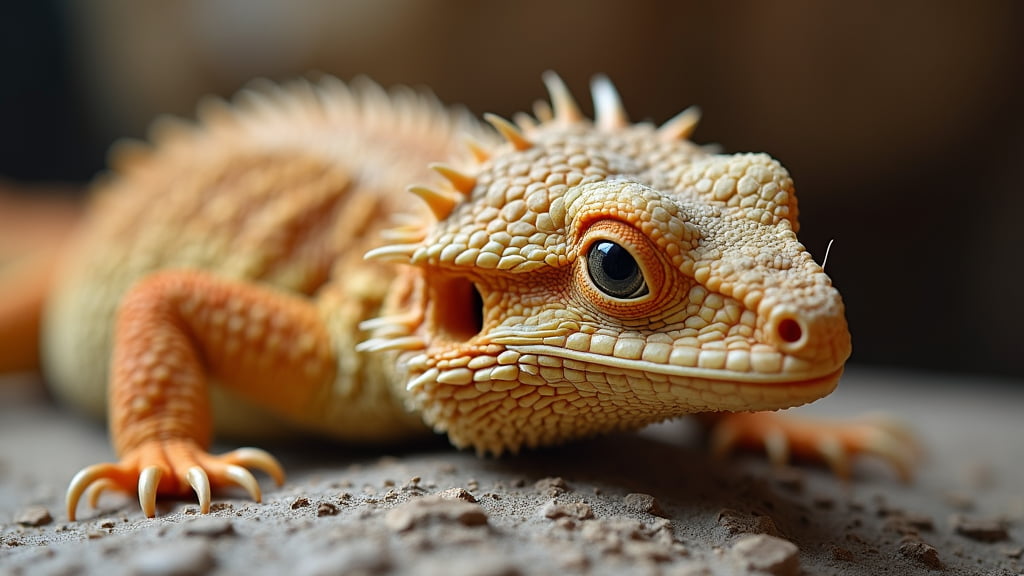Bearded dragons make fascinating and rewarding pets, with their quirky personalities and relatively straightforward care requirements. However, ensuring they thrive in captivity hinges on providing a well-balanced diet, and equally important, knowing which foods to avoid. As an experienced exotic pet owner, I can’t stress enough the importance of steering clear of certain foods for maintaining your beardie’s health. Read on for informative insights on the foods to avoid, underpinned by years of hands-on experience and expert advice.
Why Diet is Crucial for Your Bearded Dragon’s Health
Proper diet and nutrition are cornerstones of bearded dragon care, directly impacting their growth, longevity, and overall well-being. An improper diet can lead to a host of health issues ranging from nutritional imbalances to severe metabolic diseases. With that in mind, let’s delve into the specific foods you should keep off your beardie’s menu.
Harmful Foods to Avoid
Avidin-Containing Foods: Raw Egg Whites
What is Avidin?
Avidin is a glycoprotein found in raw egg whites that binds biotin, a necessary B-vitamin. Avidin effectively renders biotin unavailable for absorption, leading to a deficiency.
The Impact on Bearded Dragons
Bearded dragons rely on a range of vitamins and minerals for their health. Biotin deficiency in bearded dragons can manifest as:
- Weak muscles
- Dry, scaly skin
- Poor appetite
While I often use cooked eggs sparingly as a protein treat, raw eggs are strictly off the table.
Oxalate-Heavy Foods: Spinach and Beet Greens
Understanding Oxalates
Oxalates are organic compounds that inhibit calcium absorption by binding to calcium and forming insoluble crystals. This issue is particularly concerning for bearded dragons, where calcium is crucial for bone health and muscle function.
Why Spinach and Beet Greens are Problematic
While spinach and beet greens might seem like nutritious choices, they are high in oxalates, which can lead to:
- Nutritional secondary hyperparathyroidism (NSHP)
- Metabolic bone disease (MBD)
My bearded dragons thrive on a diet low in oxalates, hence I avoid spinach and beet greens.
Toxic Foods to Steer Clear Of
Avocado
The Toxins in Avocado
Avocado contains persin, a fungicidal toxin that is harmful to a variety of animals, including bearded dragons.
Symptoms of Avocado Toxicity
The ingestion of avocado can lead to severe health conditions such as:
- Respiratory distress
- Heart failure
- Death
In my years of raising bearded dragons, I’ve found it best to leave avocados out of their diet entirely.
Rhubarb
Poisonous Components in Rhubarb
Rhubarb contains oxalates as well as other toxins that are highly poisonous to bearded dragons.
Health Risks
Feeding rhubarb can result in:
- Kidney failure
- Neurological damage
- Possibly fatal outcomes
This vegetable, while delicious in a human context, is something I never consider for my dragons.
Foods That Pose Digestive Issues
High-Fat Foods: Dairy and Meat
Bearded Dragons and Lactose Intolerance
Bearded dragons are inherently lactose intolerant. They lack the enzyme necessary to digest lactose found in dairy products.
Health Implications
Feeding dairy can lead to:
- Diarrhoea
- Dehydration
- Gastrointestinal upset
Inappropriate Protein Sources: Meat
While bearded dragons do need protein, they typically get enough from insects and occasional small rodents. High-fat meats can be too rich and cause:
- Obesity
- Liver disease
Foods High in Phosphorus: Cabbage and Broccoli
The Calcium-Phosphorus Balance
A proper calcium to phosphorus ratio is essential for bearded dragon health, ideally around 2:1. Foods high in phosphorus can disrupt this balance.
The Downside of Cabbage and Broccoli
Both these vegetables have more phosphorus than calcium, causing potential issues like:
- Metabolic bone disease (MBD)
- Decreased calcium absorption
Conclusion: Prioritise Your Bearded Dragon’s Well-being
Knowing what to avoid is just as important as knowing what to feed your bearded dragon. By steering clear of foods such as raw egg whites, spinach, avocados, rhubarb, high-fat meats, and dairy, you’ll provide a safer, healthier, and happier life for your pet. Always consult with a specialised veterinarian for personalised advice, and remember that an informed owner is a bearded dragon’s best friend.
For more detailed insights into proper care, visit our Bearded Dragon Care Guide. If you have any concerns about your bearded dragon’s diet, consult a specialised vet.
Becoming a responsible bearded dragon owner means continuous learning and adapting based on expert advice and experiential wisdom. Feed smart and keep your bearded dragon healthy!
For recommended foods and supplies, check out our selection on Amazon.

